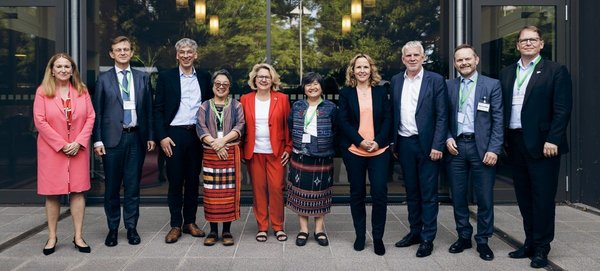 Read this article in French
Read this article in French- Share this article
- Subscribe to our newsletter
UN nature summit has to herald the restoration of nature
The aim of the UN nature summit of the UN Convention on Biological Diversity (CBD) is an ambitious global agreement. One key for the required turnaround in efforts to stem the extinction of species and simultaneously towards sustainable development and food security was the restoration of fertile soils, rivers, forests and moors, Germany’s development and environment ministries declared in a joint press release on the 14th June.
According to the press release, the high-ranking dialogue event was aimed at preparing the UN nature summit, at which a global agreement on nature conservation world-wide and the renaturation of destroyed ecosystems was to be achieved.
"The situation is alarming,” warned Federal Minister of Economic Cooperation and Development Svenja Schulze, adding that on average, one species was vanishing from Earth every ten minutes. “The crisis isn’t just affecting plants and animals, but us people too, above all. Without nature, humans face the forces of nature unprotected, whether it be the heat-wave in India, the locust plague in the Horn of Africa or floods in Bangladesh.”
Schulze warned that the hunger crisis was also closely linked to the state which nature was in. “Succeeding in conserving nature and restoring destroyed ecosystems is a good recipe for more global food security, too,” the minister said in Berlin.
According to Federal Minister of the Environment Steffi Lemke, species extinction is the second major ecological crisis alongside that of the climate crisis. Germany’s Federal Government had set itself the goal of halting the destruction of nature with visible progress in nature conservation.
“At global level, the UN nature summit is the next milestone. As a result of efforts, I am hoping for an ambitious global agreement by the end of this year,” Lemke stated, adding that she was also engaged at national level in seeing to it that synergies between nature and combating global warming were made use of. With the new action programme “Natural Climate Protection”, the Federal Government was protecting, strengthening or restoring natural and near-nature ecosystems such as moors, water meadows, forests and pastureland, as well as marine and coastal ecosystems, Lemke said in Berlin.
A million species are threatened by extinction – high time to take action!
Never before in history has Earth irretrievably lost so many species as it is losing now. Out of an estimated eight million species, one million are threatened by extinction. With the loss of ecosystems, possibilities for humans to grow food or balance climate shocks are dwindling, too.
The press release issued by the two ministers also points out that in this critical situation, at the next UN nature summit, an ambitious global agreement is to be achieved which conserves biological diversity while simultaneously enabling human development and sustainable use of nature.
In the negotiations, in addition to ambitious goals, the Federal government is above all campaigning for their effective implementation. It will make protecting natural areas and restoring damaged ecosystems a priority objective. Here, it is important to involve the local population, and in particular indigenous people, in nature conservation and maintain their rights.
In addition to the two ministers, more than 100 international partners from politics, civil society, business and science participated in the dialogue event, including Elizabeth Mrema (Executive Secretary of the UN Convention on Biological Diversity), Representative of Inidigenous Peoples Victoria Tauli-Corpuz (Tebtebba Foundation) and Ana María Hernández (Chair of the World Biodiversity Council IPBES).
The United Nations has declared the decade from 2021 to 2030 the UN Decade on Ecosystem Restoration. The basic notion behind the new decade is that the global sustainability goals for 2030 can only be achieved if the world-wide destruction of ecosystems is halted, their conservation is ensured and their restoration is tackled.
In order to cope with these huge challenges, the Federal Ministries of Development and the Environment have, for the first time, raised their investments in the world-wide conservation of biodiversity to more than 1.1 billion euros.
(BMZ/BMUV/wi)
Further information at BMZ website
BMUV information on international biological diversity
Rural 21, Issue 2/2021: "Biodiversity"





Add a comment
Be the First to Comment